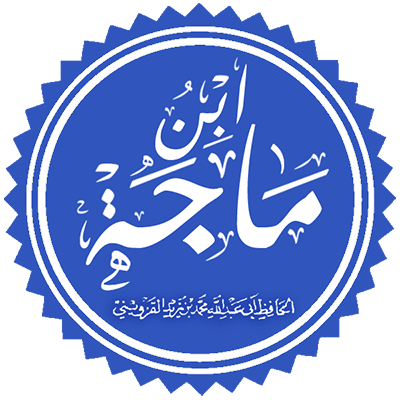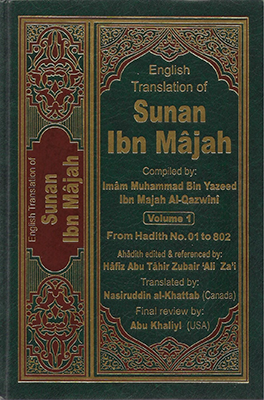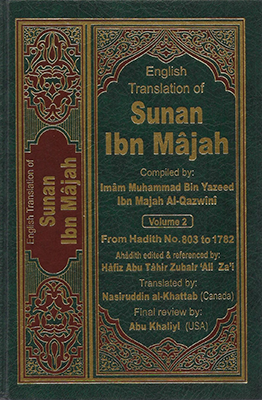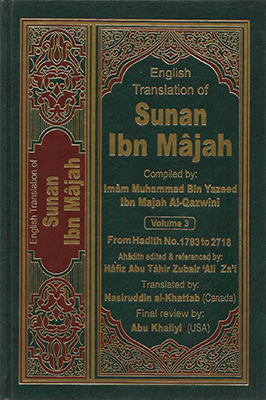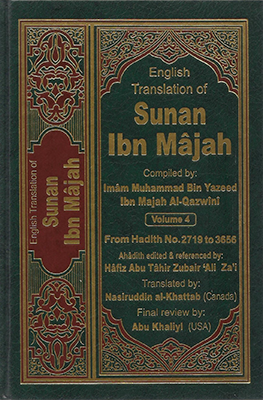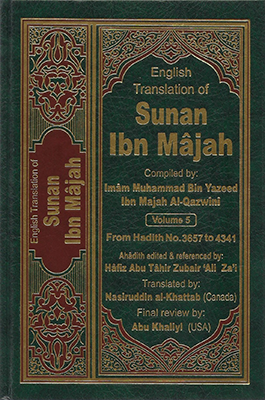Imam Ibn Majah (رحمه الله) is a bright star that continues to shine to this day on the firmament of Hadith sciences. He is counted among the greatest and most high-ranking Imams of Hadith. He has also the honor of being one of the six Imams whose collections of Hadith are widely popular among the Muslims.
Like other Imams, he earned great fame for serving the Hadith sciences and played an important role in the recording of Ahadith. His whole life he spent watering the garden of this science. To collect and record the sayings of the Prophet (ﷺ), he traveled to several countries, learning from the greatest Hadith scholars of his times and then gathering together those pearls in a single place for the benefit of later generations.
Ibn Majah was a great scholar of Hadith, Qur'anic interpretation and history. Especially in the field Hadith sciences, he was counted as a great memorizer of hadiith and an expert in this field. For this very reason, Hafidh Shamsuddin Muhammad Dhahabi, Hafidh Ibn Hajar and other critics in the field of Hadith sciences have acknowledged his leading position, high station, breadth of vision, and the ability to memorize Hadith, extolling his academic and technical services in this field.
Name and Lineage
Abu 'Abdullah Muhammad bin Yazid bin 'Abdullah Rab'i Al-Qazvini nicknamed Ibn Majah. He was a non-Arab. He was Rab'i because he belonged to the tribe of Rab'i and was called Al-Qazvini because he belonged to Qazvin (Iran). Various explanations have been given for his nickname. Allamah Zubaidi, writing in Tajul-'Urus, has given several explanations for the nickname, one explanation being that Majah was his mother's name. Imam Nawawi gives weight to this explanation. Shah 'Abdul-'Aziz Dehlavi in Bostanul-Muhadithin says, "The correct opinion is that Majah was his mother". That is why the Arabic word for son (Ibn) is written with the Arabic letter alif to indicate that Ibn Majah qualifies Muhammad, not 'Abdullah. Anyhow, some scholars believe that Majah was his father's name. That is also the opinion of Hafidh Ibn Hajar.
Birth and Early Education
He was born in 209 AH corresponding to 824 CE. Yaqut bin 'Abdullah Al-Hamavi, quoting Ja'far bin Idris' Tirikh Qazvin, wrote: Abu 'Abdullah died in the year 273 AH and I heard him say "I was born in 209 AH." Much of Ibn Mjah's childhood is unknown but it appears that, according to the practice of those days, after receiving his early education, he turned to the Hadith sciences in his own hometown first that had become by then the cradle of Hadith sciences.
Travels in Pursuit of Knowledge
After learning from the teachers in his own home town and the towns nearby, he began his travels in 230 AH, when he was 21 or 22 years old, to other countries to acquire more of Hadith sciences. Ibn Jawzi writes in Al-Muntazim:
He travelled to Khorasan, Iraq, Hijaz, Egypt and Sham and attended the gatherings of Hadith scholars.
Imam Hanbal writes: He journeyed to Kufah and Basrah, Egypt, and Sham. He also learned from the scholars of Makkah and Al-Madinah and, later, traveled to Baghdad that was in those times, according to Imam Dhahabi, the 'home of chains of narration and memorization' (Darul-Isnadul-Ali wal-Hifdh), the seat of the caliphate and knowledge. But he never ceased or tarried but continued his journeys in quest of knowledge. Again he traveled to Damascus, Homs, Egypt, Isfahan, Ashkelon (seaport in SW Palestine) and Nishapur where he became a pupil of the stars and celebrities of Hadith sciences. This gives us a good idea of how hard he strove to learn Hadith sciences and, in his desire to collect Ahadith, journeyed to distant seats of learning.
His Teachers
Imam Ibn Majah had the honor of learning Hadith sciences from a number of great scholars of his times including those of Makkah, al-Madinah and Qazvin. Among those of al-Madinah were Hafidh Ibn Mus'ab Zubairi, Ahmad bin Abu Bakr Al-'Awfi and Hafidh Ibrahim bin al-Mundhir. His Makkan teachers were Hafidh Jalwani, Abu Muhammad Hasan bin 'Ali al-Khilal, Hafidh Zubair bin Bakkar, the Judge of Makkah, Hafidh Salamah bin Shabib, etc. Notable among his teachers in Qazvin were 'Amr bin Rafi' Bajali, Isma'il bin Tawbah and Muhammad bin Abu Khalid Qazvini. He also studied under other prominent teachers like Jubarah bin Mughallis, Abu Bakr bin Abu Shaibah, Nasr bin 'Ali Nishapuri, Abu Bakr bin Khallad Bahili, Muhammad bin Bashar, Abul-Hasan 'Ali bin Muhammad Tanafisi and 'Ali bin Mundhir.
His Pupils
The list of his pupils is very long. They are scattered far and wide, in Qazvin, Hamadan, Isfahan, Baghdad, and other places. Notable among them are 'Ali bin 'Abdullah al-Falini, Ibrihim bin Dinar al-Jarshi, Ahmad bin Ibrahim Qazvini, Hafidh Abu Ya'la Al-Khalili and Abu 'Amr Ahmad bin Muhammad bin Hakim al-Madani al-Isfahani.
Narrators of Sunan Ibn Majah
Among his closest students who had the honor of narrating Sunan Ibn Majah were Abul-Hasan al-Qattan, Sulaiman bin Yazld, Abu Ja'far Muhammad bin 'Eisa, and Abu Bakr Hamid al-Abhari.
Recognition of his eminence by Scholars
A great Hadith scholar, interpreter of the Qur'an and historian, his outstanding rank, especially in the field of Hadith sciences, has been acknowledged by scholars of Hadith sciences in every age.
Imam Dhahabi says:
Imam Ibn Majah remembered Ahadith by heart. He was a critic in the field of Hadith sciences, truthful, upright and a man of wide learning.
Imam Dhahabi wrote in Tadhkiratul-Huffadh:
He was a great memorizer of Ahadith and a Hadith scholar and Qur'an interpreter of Qazvin.
Abu Ya'la Khalili said:
He was very trustworthy and an authority; and had a deep knowledge of Hadith sciences.
Allamah Sindi said:
Among the Imams of Hadith, he had a high rank, was pious and a trustworthy scholar by consensus.
Writings of Ibn Majah
After completing his education, Ibn Majah turned to writing and composing and left behind three great works:
As-Sunan: The Sunan Ibn Majah is counted among the authentic six mother books of hadith.
At-Tafsir: It was a large commentary on the Qur'an in which the Imam had collected Ahadith and comments of the Companions and Tabi'in supported with chains of narrations. Suyuti counted this commentary and that of Ibn Hatim among the voluminous commentaries of Qur'an. Ibn Kathir, in Al-Bidayah, said the same thing.
At-Tarikh: A great history book and a manifestation of his great scholarship and leaming, Ibn Kathir called it a complete history while Ibn Khalkan, the famous historian, called it Tarikh Malih (nice history).
It is a pity that the last two books are no longer extant.
Death
The Imam died on Monday, 22 Ramadan, 273 AH corresponding to 887 CE, aged 64. May Allah forgve him and have mercy on him. Ameen.
Many a poet wrote moving elegies on his death. Hafidh Ibn Hajar, in Tahdhibut-Tahdhib, quoted a verse written by Muhammad bin Aswad Qazvini:
The loss of Ibn Majah weakened the columns of the throne of knowledge and shook up its pillars.
